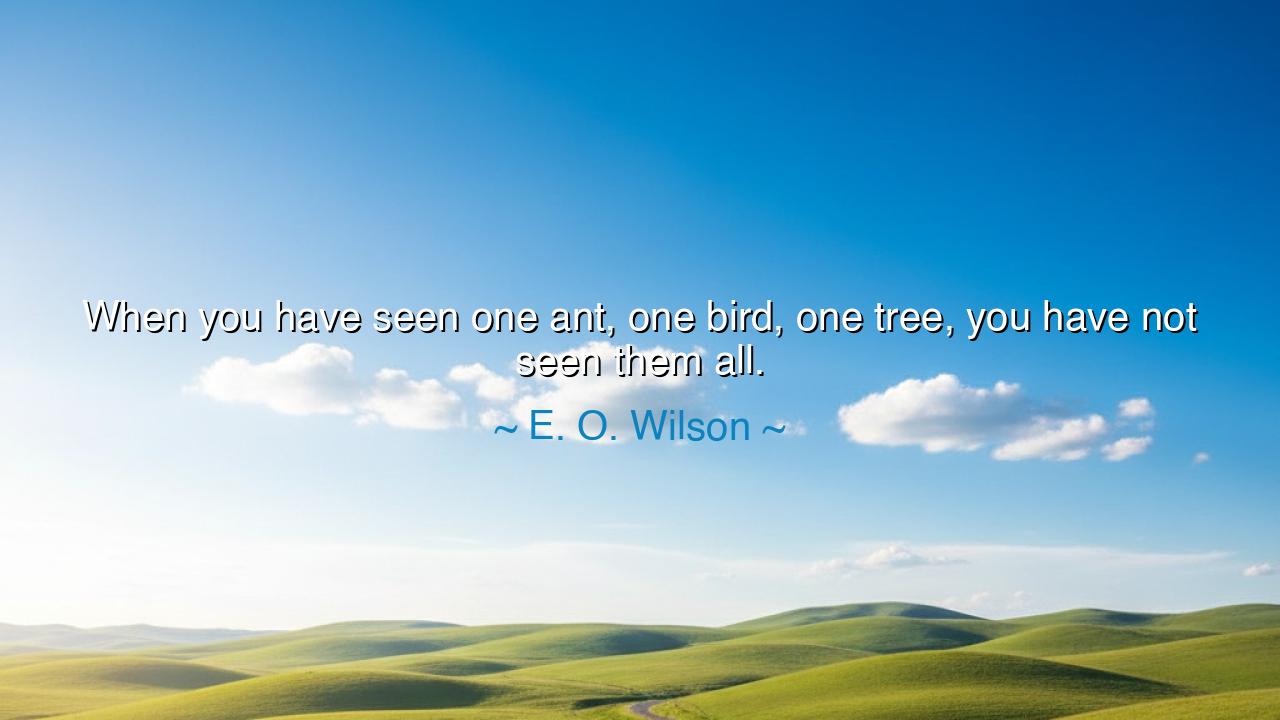
When you have seen one ant, one bird, one tree, you have not






E. O. Wilson, the great naturalist and biologist, once declared: “When you have seen one ant, one bird, one tree, you have not seen them all.” These words are simple, yet they carry the depth of oceans and the vastness of forests. They are a cry against the blindness of arrogance, against the temptation to believe that a single glance can exhaust the mysteries of creation. In this saying lies a hymn to diversity, a reverence for the individuality of every living being, and a call to humility before the boundless complexity of nature.
Wilson, known as the “father of biodiversity,” spent his life studying ants, those tiny architects of the earth who shape forests and fields with their hidden societies. Through decades of patient observation, he discovered that no two species, and indeed no two individuals, are ever fully alike. Each bird sings its own song; each tree carries its own form, its own scars, its own story. To assume that one sight is the sum of all sights is to betray the truth of life’s endless variety. His quote springs from both science and reverence: knowledge gained through study, and awe gained through wonder.
The ancients, too, knew this lesson. Consider the philosopher Heraclitus, who said, “No man ever steps in the same river twice, for it is not the same river and he is not the same man.” Just as the river is ever flowing, so too is nature ever changing, unique in each expression. One who sees a single tree and claims to know the forest is like one who hears a single note and claims to know the whole symphony. It is the folly of haste, the arrogance of shallow sight.
History also bears witness to the danger of ignoring this truth. When European explorers first encountered the New World, many assumed the animals and plants they saw were simply variants of those they already knew. Yet each continent was a tapestry of life unknown, and their ignorance led to mistakes—failed crops, misused medicines, misunderstood ecologies. Only those who humbled themselves before the uniqueness of each bird, each tree, each creature, came to thrive. Thus, Wilson’s words remind us: the refusal to see difference is not wisdom, but blindness.
The teaching is both scientific and spiritual. It is scientific, because biodiversity is the foundation of life—every species has its role, every organism its place in the web of existence. It is spiritual, because it calls us to reverence: to look at the smallest ant or the tallest tree and see not repetition, but miracle. To dismiss life as “all the same” is to close one’s eyes to the sacred richness of the world. To open one’s eyes is to discover that the earth is infinite in its expressions, and that wonder is renewed in every encounter.
Therefore, the lesson is clear: approach the world with curiosity, not complacency. Do not say, “I have seen this before,” but instead ask, “What makes this moment, this creature, this leaf unique?” In the classroom, this means seeing each student as an individual soul, not just another face. In friendship, it means listening to each voice with fresh ears. In nature, it means recognizing that every walk in the woods is an encounter with the never-before-seen.
Practically, let us live this wisdom by slowing our steps and widening our gaze. Keep a journal of what you observe: the details of a bird’s flight, the veins of a leaf, the pattern of clouds. When meeting people, resist the temptation to assume you know them after one glance; instead, attend to the uniqueness of their journey. In this way, we cultivate humility and reverence, and our lives grow richer with meaning.
Thus, Wilson’s words ring like a bell across the ages: One ant is not all ants, one bird is not all birds, one tree is not all trees. The world is vast, filled with singular wonders, and to recognize this is to awaken the soul. Let us, then, walk as seekers, not as masters, with eyes wide open to the infinite miracles that surround us.






AAdministratorAdministrator
Welcome, honored guests. Please leave a comment, we will respond soon